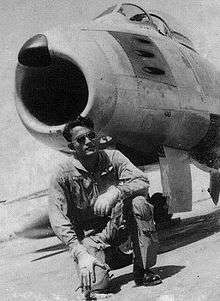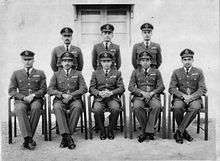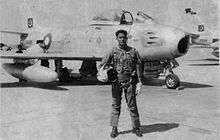Waleed Ehsanul Karim
| Flg Offr Waleed Ehsanul Karim | |
|---|---|
 Waleed Ehsanul Karim | |
| Nickname(s) | Waleed |
| Born |
July 1944 Harbang, Chakaria, Cox's Bazar, British India, Present Day Bangladesh |
| Died |
19 April 1965 Near Karachi |
| Allegiance |
|
| Service/branch |
|
| Years of service | 1963 - 1965 |
| Rank |
|
| Unit | 17th Squadron (the Tigers) |
| Battles/wars | Indo-Pakistani War of 1965 |
| Signature |
|
Flying Officer Waleed Ehsanul Karim, Shaheed (Martyr) (Bengali: ওয়ালীদ এহসানুল করিম) (July 1944, Harbang, Chakaria – 19 April 1965, Karachi) was a Pakistan Air Force's fighter pilot and one of the youngest F-86 Sabre Jet pilots in the entire world.[1]
Background
Karim was born in July 1944 to Captain Advocate Fazlul Karim and Nazmunnisa Chowdhurani at Harbang, Chakaria, Cox's Bazar, British India (now in Bangladesh). He had completed his Senior Cambridge from PAF Public School Sargodha (formerly PAF College Sargodha) in April 1961 (5th Entry, Sabre House) and joined the Pakistan Air Force in August 1961.
PAF career
He was commissioned in the PAF on 22 June 1963 in the 36th GD(P) Course. He was the Wing Under Officer (WUO). He was also selected for Sword of Honor but did not get it. In a debate in the academy he had mentioned the Language Movement of 1952 which compelled the government to establish Bengali at par with Urdu. He was later nominated as Pakistan Air Force Basketball team captain at Air Force Academy, Risalpur.


Fighter Pilot of PAF
He was famous for his daring stunts with his F-86 Sabre. He took part in the Republic Day fly past at Rawalpindi on 23 March 1964. He died when his recently repaired aircraft (which was hit by anti-aircraft guns at Rann of Kutch in the morning sortie) developed engine trouble and plunged into the Arabian sea about 10–15 miles off the south coast of Karachi in the night of 19 April 1965 when he was returning from a reconnaissance mission over Gujarat.
Indo-Pakistani 1965 War
He had participated at the Rann of Kutch battle by dropping smoke bombs in daytime to screen the infantry attacks. Neither his body, nor the aircraft was recovered. But a part of the rudder was later recovered from the same location after two months. At that time he was a fighter pilot of 17th Squadron (the Tigers) of the Pakistan Air Force. Air Marshal Azim Daudpota was his Squadron Leader during that time. Flight Lieutenant M. Matiur Rahman, Bir Sreshtho, Air Vice Marshal Momtaz Uddin Ahmed were his course mates in both Sargodha and Risalpur.
References
- ↑ Bowman, Martin (2016-01-30). Cold War Jet Combat: Air-to-Air Jet Fighter Operations 1950-1972. Casemate Publishers. ISBN 9781473874626.